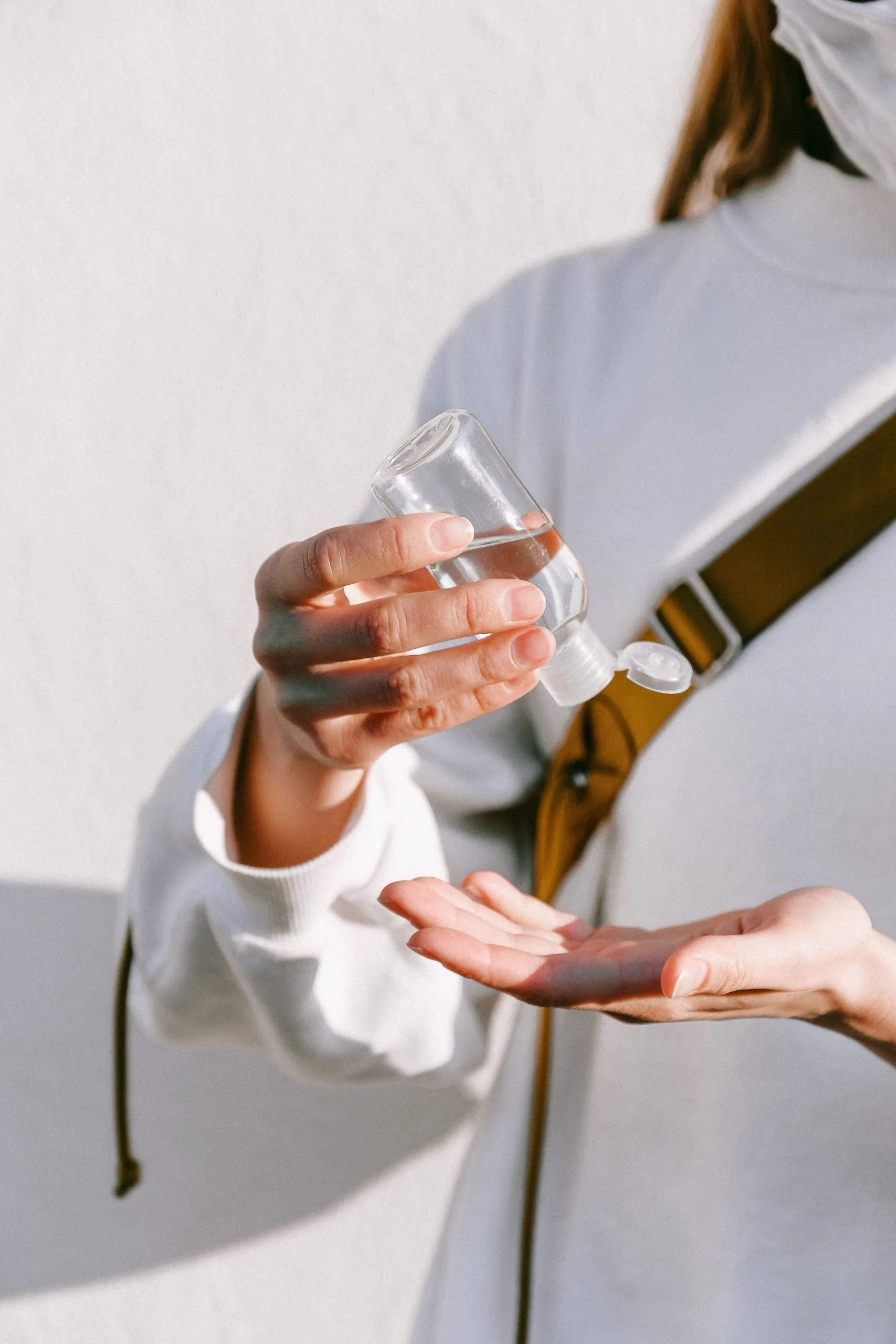In 2020, hand sanitizer is pretty much unavoidable thanks to Covid-19. Keeping your hands clean is one of the main ways of combatting the virus. Ideally, we’d all be washing our hands with soap and water regularly. Unfortunately, it’s just not possible for people to access it meaning that sanitizer is a more accessible idea. It’s just not going to be possible to have hand basins outside shops like H&M so that people can wash their hands before entering. Sanitizer on the other hand is quick, easy to use, and doesn’t require running water.
What is in hand sanitizer?

Photo by RODNAE Productions from Pexels
The hand sanitizers which we are advised to use by our governments are alcohol-based. This is because the alcohol in them directly targets and kills microbes (4). Whilst these microbes are a natural part of our bodies, if they get under the skin surface, they can cause infections (5). This is why, before your doctor gives you an injection, they disinfect both your skin and theirs with alcohol-based sanitizer (5). Alcohol is the most commonly used disinfectant and works by “acting on lipid and protein components of the cell” to kill fungi and bacteria (5).
Hand sanitizer can come in either liquid or gel form. The CDC recommends hand sanitizer as an alternative to washing your hands with soap and water (6). According to the CDC, consumers should be using a hand sanitizer that contains at least 60% alcohol. Whilst there are plenty of helpful guides on the internet for making your own sanitizer, the FDA recommends against it (6). The only two alcohol bases that are FDA approved are ethanol and isopropyl alcohol (6).
- Please DO NOT ingest hand sanitizer. The levels of alcohol in hand sanitizer are dangerous, possibly life-threatening (4) (1).
Side effects
Hand sanitizer, when used in abundance, can cause unwanted skin issues. These can include an increased risk of eczema, skin irritation, and even skin disorders (3). Using an alcohol-based sanitizer can also disrupt the microbiomes which are naturally present on the skin (1). This kills off bacteria which is actually good for our bodies and ultimately causes more harm than good. Excessive use of sanitizer can also create stronger, more resistant strains of bacteria in the long term (1). The CDC says that any hand sanitizer with ‘antibacterial ingredients’ can contribute to the development of antibiotic-resistant strains (1). It’s also worth noting that whilst it is more widely available and easier to use, sanitizer can’t remove dirt and grime from the skin. It is also much less effective at killing bacteria when the hands are dirty (1).
Eczema, Skin Irritation and Skin Disorders
This increased contact with alcohol-based sanitizers can act as an irritant for sensitive skin. The result of this constant skin irritation is usually contact dermatitis or eczema. Both commonly result in redness, extreme dryness of the skin, and even blistering. Often, the affected skin will be either itchy or sore (3).

Ulrich Zillmann/ Getty Images
In order to prevent this from happening, Caroline Nelson, M.D. a Yale Medicine dermatologist suggests moisturizing. Moisturizers should be applied directly after handwashing. In the case of sanitizer, “Individuals should rub their hands together for about 15-30 seconds covering all surfaces with hand sanitizer until the hands are dry, and then apply a moisturizer” (3). Nelson recommends a mineral oil or petroleum-based moisturizer to prevent dermatitis.
Final word
Whilst sanitizer is government recommended and much more accessible than soap and water, it isn’t a replacement. It’s ideal to wash your hands with plain (not antibacterial) soap for 20 seconds when you can. If your hands get visibly dirty or start to feel sticky from the hand sanitizer, go to the bathroom and wash them. In all likelihood, at this point, the sanitizer is no longer doing its job anyway. Make sure to keep your hands well moisturized.
References
- https://timesofindia.indiatimes.com/life-style/health-fitness/health-news/this-is-what-happens-to-your-body-when-you-use-hand-sanitizer-every-day/photostory/75600580.cms?picid=75600630
- https://www.thestreet.com/markets/5-hidden-dangers-of-hand-sanitizers-12966410
- https://www.eatthis.com/side-effects-hand-sanitizer-doctors/
- https://slate.com/news-and-politics/2012/04/drinking-hand-sanitizer-do-different-forms-of-alcohol-get-you-drunk-in-different-ways.html
- https://www.umsl.edu/microbes/Classroom%20Activities/skindisinfectantlab.pdf
- https://www.fda.gov/drugs/information-drug-class/qa-consumers-hand-sanitizers-and-covid-19



![women [longevity live]](https://longevitylive.com/wp-content/uploads/2020/01/photo-of-women-walking-down-the-street-1116984-100x100.jpg)










